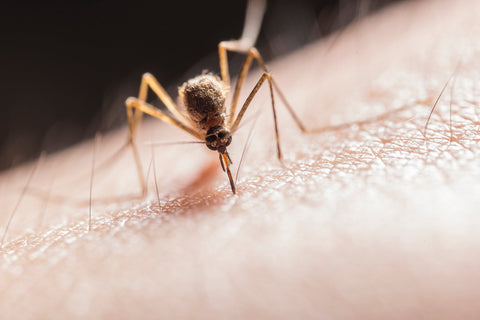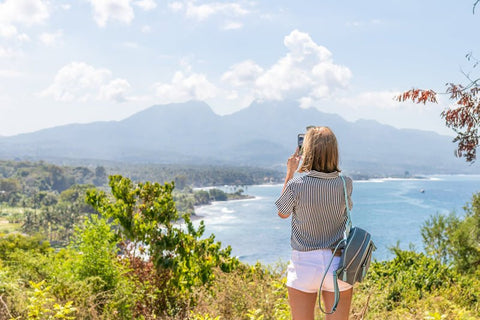Did you know that the mosquito is responsible for more human deaths than any other animal on earth (including other humans)? Their capacity to carry disease and infect us with one swift bite has been a plague throughout history – and there are few species that have caused as much misery as Aedes aegypti.
Just 4mm in length, this family of mosquitoes are responsible for the transmission of diseases such as yellow fever, dengue, chikungunya and topically, the Zika virus. Whilst scientists have been trying to formulate ways to neutralise their effects, the use of insect repellent remains the best way to ward off mosquitoes.
Here, we’re going to be talking about the history of mosquito repellent; how it was developed and why it’s still a key weapon in humanity’s bid to ward off disease-spreading insects.
The History of Insect Repellent
-
1881-1894: “The French Panama Canal failure”. With the Industrial Revolution being at its height by the late 19th century, new ways to transport goods across large swathes of the globe were in demand. Following the successful construction of the Suez Canal in 1869 (connecting the trading ports of the Mediterranean with those in the Red Sea, slashing sailing times between Europe and East Asia), French diplomat, Ferdinand de Lesseps, commenced upon the idea of building a similar sea-level canal in Panama, connecting the Atlantic and Pacific Oceans.
However, during construction over 20,000 workers died in several epidemics, later identified to be malaria and yellow fever. As the effects of mosquito bites were not known about, safeguards (such as an insect repellent and mosquito netting) against them were not taken. With the project also running into financial problems, the canal was abandoned and sold off to a company headed by the United States. - 1890/1904: “Finding the source of yellow fever; helping to complete the canal”. In 1890, whilst the French Panama Canal project was winding down, Walter Reed, a US Army doctor, discovered (and proved) that mosquitoes were responsible for the transmission of yellow fever. This gave the new owners of the project all the information they needed to put in place protections against mosquitoes; installing screens, draining swamps and covering standing water with oil (to kill larvae). This mosquito control paved the way for the Panama Canal to be completed.
-
1939-72: “The rise (and fall) of DDT”. The war against mosquitoes was made winnable, thanks to the discovery that dichlorodiphenyltrichloroethane (also known as DDT, thankfully) kills insects. Synthesised by Paul Muller, DDT was formulated to create several pest control products over the next 20 years. For his work, the Swiss chemist won the Nobel Prize for physiology and medicine in 1948.
In the early 1960s, however, shortcomings were found with the application of products that contained DDT. They were found to disrupt endocrine systems in animals (including humans), leading to serious health concerns and even causing reproductive problems in predators. Added to this, it was also found that mosquitoes had quickly developed a resistance to the previously-devastating effect of the chemical.
In 1972, the United States banned DDT (1984 in the UK) and producers moved to synthetic insecticides/repellents instead. However, mosquitoes would build up a resistance, requiring the creation of new synthetic chemicals. -
1944- The discovery and formulation of DEET. An alternative to DDT that has been in consistent use as an insect repellent since the end of the Second World War, is DEET (diethyltoluamide). Synthesised in 1944 by Samuel Getler of the United States’ Department of Agriculture, DEET was developed for the US Army following its experiences of jungle warfare. Originally tested as a pesticide on farms, DEET was used by the military from 1946 before entering the civilian market a decade later.
DEET works by essentially forming a vapour barrier on the surface of the skin. The chemical repels insects by interfering with the neurons and receptors (that are located on a mosquito’s antennae and mouth) – the parts they use to detect human-produced chemicals such as carbon dioxide and lactic acid. -
Today: “Natural insect repellents; suitable for almost everyone”. Not only do mosquitoes quickly build up a resistance to some synthetic chemicals (like DDT), the toxicity levels of synthetic repellents means that they won’t suit different skin types (finding one to suit sensitive skin is difficult, for example). Time and further study has allowed us to understand the effects of natural chemicals, found in plants across the world. When formulated into an insect repellent, they offer a much more inclusive defence against mosquitoes for people with different skin types.
The challenge is choosing the right brand – so if you’re interested in trying out a natural repellent to ward off mosquitoes, why not go incognito®?
Incognito®: The Best Natural Defence Against Mosquitoes
Here at incognito®, our mission is to provide our customers with a 100% natural mosquito repellent that is as effective as synthetic alternatives, the only difference being, it needs to be re-applied a little more frequently. By using all-natural ingredients, our products can be used by people with sensitive skin and by children aged from 6 months. Furthermore, they have been clinically proven to offer protection against Zika and malaria-carrying mosquitoes, making them ideal to use in tropical climates.
For day use, check out our spray, suncream and/or roll-on ranges. Extremely lightweight and compact, they are a perfect companion for your tropical holiday – whether you’re away from the hotel for long days, backpacking or staying in a tent or caravan.
For all-day and night use, we have formulated an anti-insect ‘room refresher’ that acts as a plug-in, leaving your room smelling like a fresh pine forest. Requiring no batteries, it is 100% natural and chemical-free; the citrusy fragrance it emits is idealin experiencing a relaxing and stress-free sleep.




Comments (0)
There are no comments for this article. Be the first one to leave a message!